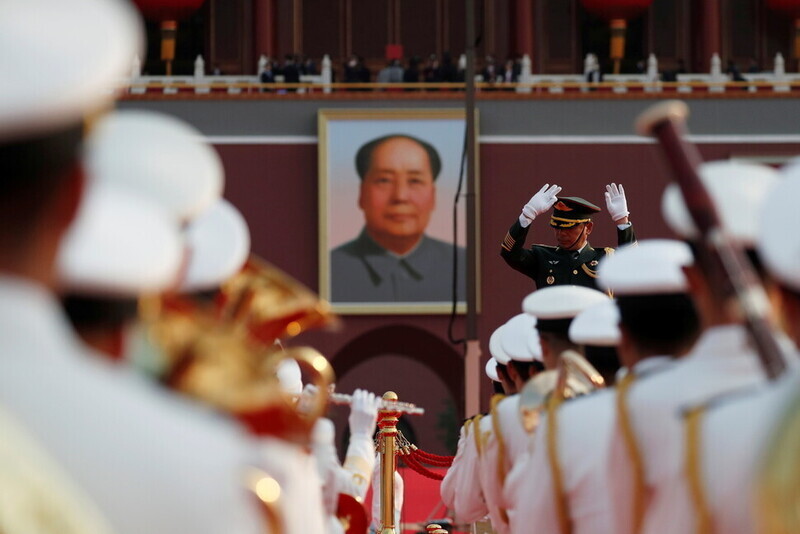How should we assess pan-Asianism on the left? In an interview on a Russian state TV channel in April, international arms dealer Viktor Bout told a reporter he had sent a telegram to Trump urging him to flee to Russia for safety, saying that it was in the best interests of humanity to protect the former US president “so that he leads this uprising against the globalists.”
Absurd as it may sound, this proposal of a direct alliance between today’s Russia and Trumpian populism renders perfectly the underlying ideological project of Russia: that of a new multipolar world in which even the people of the states which dominate in today’s global order will be liberated. When Putin says America has “nothing to offer the world except domination,” he is attacking America as a global power which at the same time exploits the majority of the American people (for whom Trump speaks).
However, China cannot be said to advocate the Russian version of the new world order. For over a century, China has been following another project: pan-Asianism.
Pan-Asianism emerged toward the end of the 19th century as a reaction to Western imperialist domination and exploitation. From the very beginning, it was a complex project of economic and political emancipation based on the rejection of Western liberal individualism. It came in many shades, but its main ingredients were anti(-Western)-imperialism and the ideal that Asia does not have to follow the Western way of progress — i.e., that it can appropriate its premodern traditions to organize its own industrial modernization in a way that will be even more dynamic than that of the West.
Pan-Asianism oscillated between its socialist and fascist version — with the two often not even clearly divided. We should not forget that “anti-imperialism” is not as innocent a motto as it may appear; both the Japanese and the German fascists regularly used this motto, presenting themselves as defenders against American, British and French imperialism.
Today, the main promoter of a communist pan-Asianism is Wang Hui, a Chinese thinker who, while faithful to Maoist legacy, in matters economic remains a social democrat. Wang insists that what we are witnessing today is not the consequence of the market economy as such but of its distortion. “Resistance against monopolization and domineering market tyranny cannot be simply equaled with the struggle ‘against’ the market, because such social resistance itself includes the efforts striving for fair competition in the market and for economic democracy,” says Wang.
“The struggle for social justice and fair market competition cannot be equaled with the opposition to state intervention. It rather requires socialist democracy, namely, to prevent the state from becoming the protector of domestic monopoly and multinational monopoly through the society’s democratic control of the state,” he writes.
Xi Jinping says his new round of reforms is targeted much more at the new big corporate monopolies, but can one seriously claim that we have “society’s democratic control of the state” in the China of today? We can on one condition: that we posit equality between “society” and “the Communist Party.” The party controls the state on behalf of the people, but what we certainly do not see is society’s democratic control of the party.
Wang Hui advocates social democracy, with the additional claim that if social democracy is grounded in Asian civilizational traditions, it renders it possible to avoid the Western type of multi-party democracy and enact a social order with much stronger people’s participation. Along these lines, he rejects the claim that Mao Zedong and Deng Xiaoping are to be opposed as excluding each other, and that Xi simply stands for a (limited) return to the Maoist hard line: They are all part of a continuous emancipatory process which began with Sun Yat Sen and reaches up to Chinese intervention into Korean War and recent attempts to unite with Taiwan. The narrow Western view misses this key point, seeing in this process only a struggle between “Western liberal democracy” and Communist “totalitarianism.”
Wang tends to think of Europe as a domain of nation states, and China as a unique multicultural civilization. But we perceive today in China a tendency toward a strong united nation state with a tight control of minorities, extolling “patriotism” as the supreme value. Today’s European Union is much more multicultural, with growing regionalism and minorities demanding more autonomy, such as in Scotland, Wales, Basque Country, and Catalonia.
Another pan-Asian leftist argument is that in Europe and the US, capital reigns directly, with the state apparatus mostly just serving it, while in China the movement of capital is subordinated to state control and regulation. But with regard to socio-economic rights, Europe is still far more socially democratic than China.
Wang and other pan-Asianists on the left refer to what they call “people’s wars” as something that characterizes specifically Asian emancipatory movements. These are military operations that reach beyond the state army and involve large strata of civil population like farmers and workers. The examples they mention are the Chinese Revolution, the Vietnam War, and the Korean War, among others.
But when China sent “volunteers” to help North Korea (after the US intervened on behalf of the UN to enable the South to survive), these “volunteers” were simply regular army units. However, does the term “people’s war” not fit perfectly what goes on in Ukraine, where the state’s military activities are combined with local initiatives, self-organization and forms of improvisation?
China and Russia are hypocritical in their own way, their proclaimed respect for national differences is fake, it clearly prefers particular socio-political options around the world (mostly authoritarian ones). When Putin claims that also the Islamic states and the monarchies of the Persian Gulf have the right to choose their way of life, he ignores the inner antagonisms, tensions and struggles in these countries.
As the case of protests in Iran demonstrates, these inner antagonisms open up the space for another universalism opposed to the imperialist universalism: the universalism of the struggle for emancipation, of the global solidarity of all those oppressed. It is not enough just to express sympathy or solidarity with Iranian protesters. They are not out there, far from us, part of a different exotic culture. All the babble about cultural specificities is now meaningless: We can immediately see that the Iranian struggle is the struggle of us all.
We should not forget that “anti-imperialism” is not as innocent a motto as it may appear; both the Japanese and the German fascists regularly used this motto, presenting themselves as defenders against American, British and French imperialism.
Is he stupid or is he willfully lying here?
I feel like Zizek should know the difference between the socialist anti-imperialism where imperialism is itself a global economic system and the misused term which is just "when a country does empire stuff".
It feels like he's deliberately trying to muddy the waters and push back against anti-imperialists here.
Xi Jinping says his new round of reforms is targeted much more at the new big corporate monopolies, but can one seriously claim that we have “society’s democratic control of the state” in the China of today? We can on one condition: that we posit equality between “society” and “the Communist Party.” The party controls the state on behalf of the people, but what we certainly do not see is society’s democratic control of the party.
Care to justify that Zizek or are you just gonna throw that shit out there without a single word to justify it? Explain how society does not democratically control the party when it provides democratic results and 95% of the population approves of the government. It is providing MORE democratic results than any bourgeois democracy.
But we perceive today in China a tendency toward a strong united nation state with a tight control of minorities, extolling “patriotism” as the supreme value. Today’s European Union is much more multicultural, with growing regionalism and minorities demanding more autonomy, such as in Scotland, Wales, Basque Country, and Catalonia.
Speaking absolute bollocks. Only racists believe this, and only because they fucking hate it and want every country to be an ethnostate. Small groups "demanding more autonomy" is the absolute utter fringe rather than the norm of autonomy in China, and they're not winning.
Another pan-Asian leftist argument is that in Europe and the US, capital reigns directly, with the state apparatus mostly just serving it, while in China the movement of capital is subordinated to state control and regulation. But with regard to socio-economic rights, Europe is still far more socially democratic than China.
Zizek sidesteps the fact that this argument is correct (by not actually responding to it) and substitutes it with "but it's more socially democratic".
But when China sent “volunteers” to help North Korea (after the US intervened on behalf of the UN to enable the South to survive), these “volunteers” were simply regular army units. However, does the term “people’s war” not fit perfectly what goes on in Ukraine, where the state’s military activities are combined with local initiatives, self-organization and forms of improvisation?
No Zizek, no it does not fit Ukraine at all, unless you're referring to the Donbass waging a people's war against the Ukrainian state for their liberation.
This has just completely cemented the fact that Zizek is an enemy of communists in my mind. I still had doubts before, but the man is a fuck. He needs taking down a peg, or several.
'socialism is not as innocent as it may sound, as the nazis once used the term national socialism'
-zizek 2026
But we perceive today in China a tendency toward a strong united nation state with a tight control of minorities, extolling “patriotism” as the supreme value. Today’s European Union is much more multicultural, with growing regionalism and minorities demanding more autonomy, such as in Scotland, Wales, Basque Country, and Catalonia.
Bahahahaahhahaahah
Another pan-Asian leftist argument is that in Europe and the US, capital reigns directly, with the state apparatus mostly just serving it, while in China the movement of capital is subordinated to state control and regulation. But with regard to socio-economic rights, Europe is still far more socially democratic than China.
Ok but WangHui never really advocated for social democracy tho. He basically said we need a China that is more systemically like the one before the reform and opening up but adapted into the 21st century. Actually most chinese new left like wang hui and Wen tiejun do not believe in the label left and right defined by european philosophical tradition
As the case of protests in Iran demonstrates, these inner antagonisms open up the space for another universalism opposed to the imperialist universalism: the universalism of the struggle for emancipation, of the global solidarity of all those oppressed. It is not enough just to express sympathy or solidarity with Iranian protesters. They are not out there, far from us, part of a different exotic culture. All the babble about cultural specificities is now meaningless: We can immediately see that the Iranian struggle is the struggle of us all.
Ah, there it is, talk about burying the lead, ignorant western sour grapes that the Iranian student protests fizzled out.....of course never once asking let alone suspecting the reason they fizzled out
Could it be a larger and broader counter protest movement successfully overtook the student protest, yes that is the reason, but in zizek racist mind Iran is just an authoritarian black hole that you imprint any nonsensical western narrative irrespective of the actaul reality on the ground
I know zilch about the protests other than what I’ve been forced to see everywhere I go for the past few months (which has subsided recently). Could you give me a tldr?
Exile networks were activated, which manifested as protests in urban universities and a few Kurdish border towns, naturally many students and Iranian Kurds have genuine grievances independent of the rich western aligned exile networks and so joined the protests in the first few weeks, then it became obvious western powers were openly cheerleading the protests which went viral among Iranian social media and triggered massive counter-protests all over the country, especially among the urban working class
counter-protests all over the country, especially among the urban working class
I heard nothing about these.
What about the stories of Iranian women being forced to wear hijabs, being disappeared etc.?
Seeing Iranian flags being waved in downtown [big city] makes me roll my eyes, but there’s some truth to the protests, right?
Edit: Like, look at this vid I just saw of protestors in Iran singing Imagine Dragons and tell me there isn’t something USAIDy going on.
TLDR:
Europe is more free than china.europe good, china bad-fresh european thinkers in the last 200 years
how did I ever confuse this person with a leftist? he is just an anticommunist, a western chauvinist... and now it seems he is also just a neoconservative? He just sounds like Anthony Blinken or David Brooks with some extra leftist-professor-sounding critical "analysis"
Trump defecting to Russia to make agitprop is one of the better timelines
Zizek has written a silly article. We shall neither read it or respond to it.
Did zizek have a falloff with wang hui or?
I also like how zizek also believes in the same thing as Wanghui “advocate”: European Union style social democracy.
What Wanghui’s point IIRC is that the Asian economy is regionally integrated that the best is to have a more amicable relationship between the countries.
It’s not like the so called “pan asianism” that zizek cries exist with China as the regional hegemony has no parallels with the EU where France, Germany and Belgium control the economy the other members of the org, demanding restructuring of their political system if they can’t pay the EU loans. How can you be someone who see hope in the Greece's Syriza and how the EU crashed their economical policy and after some years goes like '' wow EU is democratic''
He should be canceled for writing a stupid foreword verso's book for Mao on contradition and on practice







